The Windows RT Review
by Vivek Gowri & Anand Lal Shimpi on October 25, 2012 12:00 PM EST- Posted in
- Windows RT
- Operating Systems
- Microsoft
- Mobile
- Windows 8
- Tablets
First Party Applications
Microsoft has bundled in a healthy suite of first party applications for Modern UI, including obvious suspects like Internet Explorer, Mail, Calendar, People, Maps, Messaging, and Bing, as well as apps for things like news, finance, sports, weather, remote desktop, and media playback, amongst others.
There’s also a list of desktop applications that’s a little less heartening. The familiar old Windows Accessories are still sticking around, with favorites like Paint and Notepad joined here by the classic Remote Desktop Connection application, Snipping Tool (another holdover from the Windows Tablet PC days), the Math Input Panel, and XPS document viewer. Ease of access applications, too, are desktop-based, as are system functions like Control Panel, Command Prompt, File Explorer, Task Manager, and the Run dialog. Personally, I’m disappointed that there wasn’t a Modern UI version of Command Prompt because, let’s face it, how cool would that be?
You’ll note that I left out the headlining Windows RT application: Office 2013. It’s one of the most vital pieces to the Windows RT puzzle, so it demands a bit more context - I’ll get to it in a bit, after running through some of the more notable first party applications.
The mail application here is decent, with an ultra-spartan design and a straightforward 3-column layout. You get accounts and folders on the far right, a middle column with the sender, subject, and thread information. When you expand a multi-email thread, a message preview is also shown. Finally, in the main part of the window, the selected message is displayed. If you’ve used any recent version of Outlook or Hotmail, the layout and implementation should be instantly familiar except for the Metro visual style. Compose, reply, and delete are located in the top right corner of the email window, while mark as unread and move to folder are located in the bottom edge swipe bar.
As far as options go, there really isn't much to mess with - just the ability to turn off threaded messaging. You can connect any EAS, IMAP, or POP email accounts, with support for Hotmail, Gmail, Exchange, AOL, and Yahoo mail accounts built in already. For Gmail accounts, the delete button actually just archives things - to really delete mails, you need to move the message to the deleted folder.
Mail isn't Outlook, and usability is far from perfect. Manual syncing requires an edge gesture to reveal the sync button and there's no way to just tap on a sender's name and create a new email. There are other little issues like these that keep Mail from being a best in class tablet email client. Mail works, it just isn't great.
Calendar
The calendar application is similarly focused - a very clean user interface with not too much power, but it does exactly what it needs to. It will sync to Hotmail, Google, and Outlook calendars, and I'm hoping that once there is a Facebook application, it will sync to that as well. You can pick between day, week, and monthly resolution from the bottom swipe menu, which is also where you add new calendar events. Options for adding new calendar events include date, time, length, location, repetition and reminders - the standard list. The UI is again very touch-centric, so trying to use the calendar with just the mouse is slightly frustrating since everything is hidden in the edge swipe bar. Thankfully, pressing or clicking on a particular day/time takes you directly to a new event creation page, which is pretty convenient. I like the way the calendar application operates, and the visual style is perfect for getting the information you need at a glance. Power users might find it lacking, but for basic tasks, it's more than adequate.
Messaging
The messaging application is one that has so much potential, but needs more to really be useful unless you only use Live Messenger and Facebook Chat. Personally, given the Skype acquisition and the combining of the Windows and Skype IDs (I’ll get to this later, but basically when you login to Skype, your Windows ID is linked to your Skype ID), I feel like the Messaging app should either include Skype chat in it or somehow fuse Skype with the messaging protocols already in place. I personally rely on Google Talk, and in an ideal world it would be supported as well, but I won’t hold my breath.
Nobody I know has used Live Messenger since it stopped being MSN Messenger, so I reserved most of my testing for Facebook Chat. It’s a good looking chat interface, but using it full-screen is a total waste of display real-estate. Messenger is an application that lives for Windows 8 Snap, and it’s really the perfect app to show off that capability with. Finally, a tablet operating system that’s good for instant messaging.
Bing News, Sports, and Travel
There are a variety of Bing-based applications here - News, Sports, Travel, and of course, Bing itself. I personally don’t find too much point to the Bing search app, since if I’m already in the browser it’s much easier just to search from the URL bar.
The other applications are somewhat interesting though. Sports and News are very similarly designed, so I’ll cover them together. Basically, there’s a top story that takes up most of the front page. You can horizontally scroll through a number of other headlines, aggregated from various news sources (Reuters, NYT, AP, etc) and separated by category - US, World, Technology, Business, etc. You can choose to browse the “Bing Daily” news, news specially targeted towards you, or pick from the list of sources to see each one individually. (My feed was full of technology news, wonder why.) Sports is essentially the same thing, except with the categories being sorted into the various sports. You can pick favorite teams, look at all the day’s sporting news or just the particular sport you want to see.
In either case, the articles are presented in a clean, easy to read format. For a one-stop-shop news source, it’s pretty decent. The overall treatment reminds me a bit of Flipboard a bit, while the articles themselves are displayed in a reading optimized context like Apple’s Reader mode in Safari. The treatment is obviously different - horizontal columns and page scrolling, but it’s a generally similar concept.
Bing Travel is a bit different - it has a list of popular destinations, and features numerous photos, maps, panoramas, list of attractions, hotels, restaurants, and guides for each city page. From the app, you can research the location, book flights and hotels, and use the application to guide your trip plan in terms of sites and restaurants to visit. Most big cities in each geographic region are listed, though smaller travel destinations are a bit harder to come by. I can see the app being really useful when on travel as a more convenient alternative to Yelp.


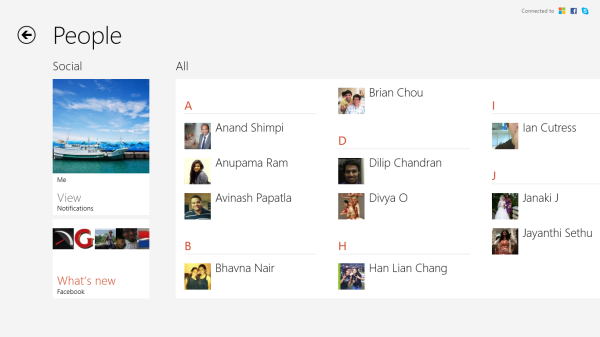
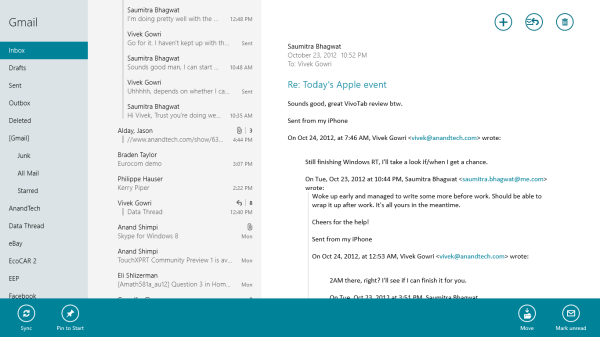
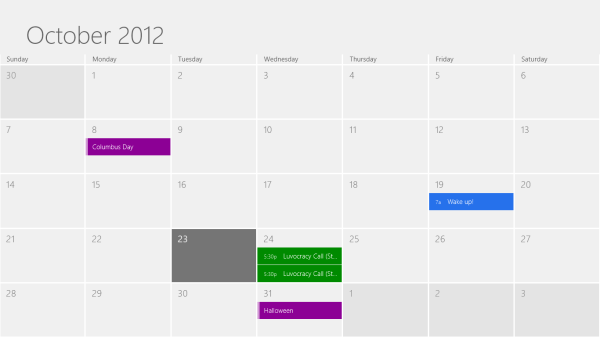
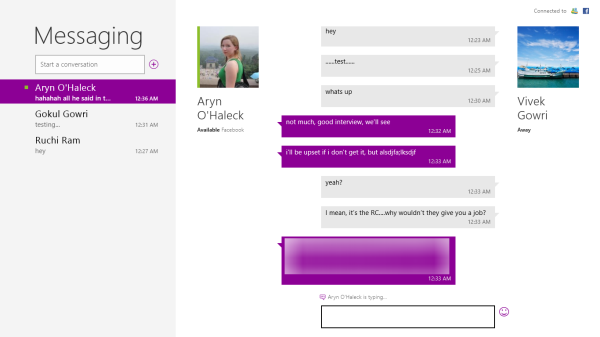
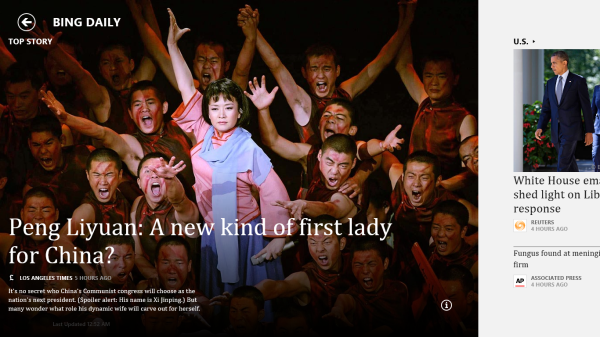
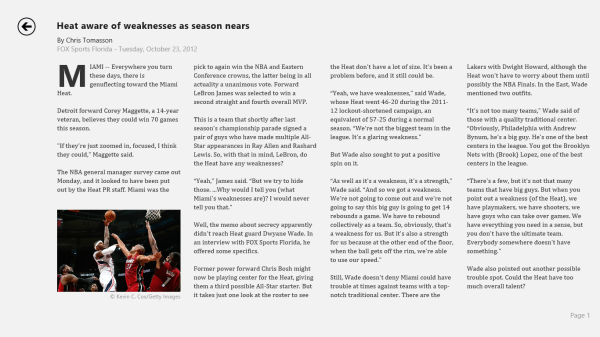
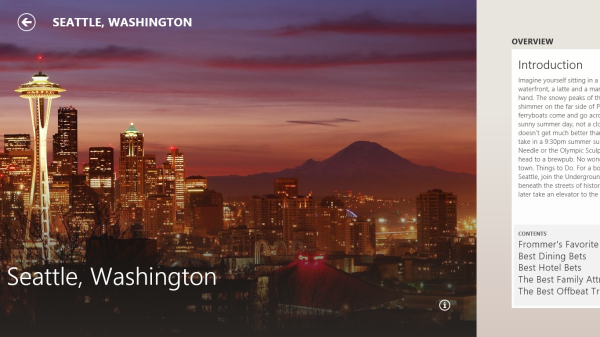








233 Comments
View All Comments
tbutler - Friday, October 26, 2012 - link
Except that, at least as I read it, Metro vs desktop divides more along 'touch vs keyboard/mouse', not consumer vs power user.Or to put it another way - while the simplicity of Metro apps might appeal to consumers, that is trumped by the issues trying to use them with a keyboard/mouse. In fact, I'd argue that the Metro environment is *worse* for a keyboard/mouse using consumer, given how so many operations are hidden/not obvious/best used with shortcuts. Windows-C to get the Charms bar is a learned power user trick, not an average user thing.
steven75 - Friday, November 2, 2012 - link
Nailed it. The "x86 userbase will ensure a massive market for Metro apps" angle is *anything* but a sure thing.Dorek - Friday, November 2, 2012 - link
"Except that, at least as I read it, Metro vs desktop divides more along 'touch vs keyboard/mouse', not consumer vs power user."Having used Metro apps with a mouse and keyboard, I don't see any problems. They work well on a laptop and on a desktop. I never had any problems.
designerfx - Thursday, October 25, 2012 - link
exactly. People aren't willing to buy a windows tablet and not a windows OS. It's not like buying android or ios here.It's simply not the same environment, the reason for android/ios is because of the app market - that is literally the singular reason to not need a windows device.
khanikun - Friday, October 26, 2012 - link
Have you even looked in the Apple's app store or Google's Play store? It's just tens of thousands of apps that do the same like 10 things and a lot of flash games converted for their respective OS. Majority of them being for non-productive uses.On my two Android tablets and my Android smartphone, I have like one productive app. Some free office like app, that allows me to open Office docs, but I can't edit them in any way. The rest? Games and photobooks.
Windows RT will definitely be a big step towards making tablets more productive than a big toy. I won't bother. I'm waiting for Windows 8 Pro.
steven75 - Friday, November 2, 2012 - link
iPad has had the iWork suite since 2010. While that may not matter to businesses entrenched in Microsoft Office, it sure is enough for students that can easily convert anything to PDF and avoid all compatibility issues.strangis - Friday, October 26, 2012 - link
"Really? A month from now? Can I hold you to that? It will be at least a year before Metro store gets even tens of thousands of apps"Just as a barometer, WP7 hit the 10,000 apps mark in under 6 months. Do you really think that it's going to take Windows 8 longer?
And you accuse someone else of lacking objectivitiy...
GuardianAngel470 - Sunday, October 28, 2012 - link
You've completely missed the reason for the statement.iOS, Android, Windows Phone, WebOS, and every other OS had to build a consumer base from scratch. By extension they had to build a developer base from scratch.
Windows RT doesn't need to do the former and by extension doesn't need to to do the latter. There are guaranteed to be millions of people running Windows 8 in a few month's time. Because Windows 8 didn't divorce Metro from its desktop and because Visual Studio 2012 Express intentionally hobbles the development of desktop applications, the developers that are guaranteed to develop for Windows 8 will be there to fill the App Store.
It can be argued that they'll focus on the development of desktop apps sure but you're basing your opinion on OS's that were never in the same situation as Windows RT.
trip1ex - Monday, October 29, 2012 - link
Gotta agree. I just don't see a huge ramp in 3rd party apps in 1 month. And I fail to what the power of Windows desktop is when RT will be running on ARM.For the problems MS will have look no further than the Zune except now you are also at an apps/developer support disadvantage.
And it doesn't just matter if RT gets apps but how those apps compare to apps on the other systems. I remember using the Mac 5 years ago when many programs were also on the Mac, but were behind the Windows versions in features and worked worse in general.
That being said I doubt most people use that many apps. We mostly surf and check email on our IPad.
guidryp - Thursday, October 25, 2012 - link
Both of these reviews feel like a whitewash to me.No mention of how buggy software is, or slowdowns and crashes that many others are reporting.
It says others are making snap judgements, but this is sweeping the defects under the rug.
Not what I expect from Anandtech.